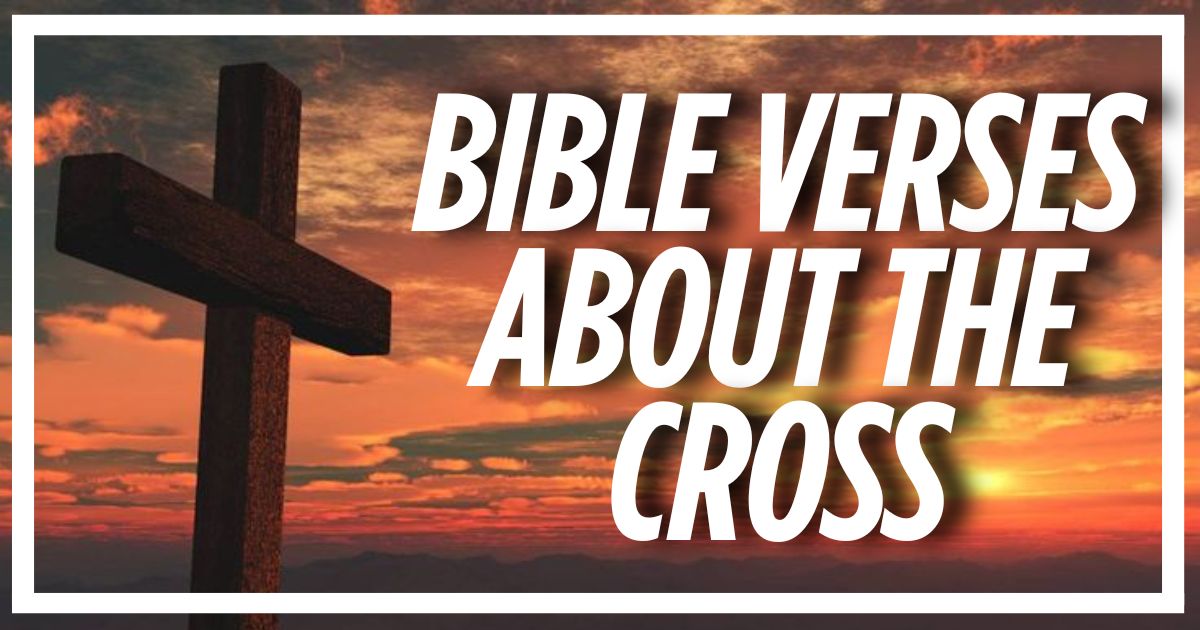The Bible Verses About The Cross show the power of Jesus’ sacrifice and God’s love. Many scriptures on the cross teach that Jesus died to save us from sin and give us eternal life. These verses about the cross remind us of His suffering, grace, and victory over death. The scripture about the cross also calls believers to follow Jesus with faith and devotion. Every Bible verse about the cross highlights its deep meaning in Christian life.
Reading Bible Verses About The Cross helps us understand salvation and God’s mercy. These scriptures on the cross explain how Jesus’ crucifixion brought hope to the world. Each bible verse about the cross teaches lessons about faith, love, and redemption. Through scripture about the cross, we learn to carry our own burdens with trust in God. Studying verses about the cross strengthens our belief in Jesus’ sacrifice and resurrection.
Top Bible Verses About The Cross
Bible Verses About The Cross reveal Jesus’ sacrifice, love, and redemption. They teach the power of faith, salvation, and the hope found in His crucifixion.
Matthew 16:24
“Then Jesus said to his disciples, ‘If any of you wants to be my follower, you must turn from your selfish ways, take up your cross, and follow me.’”
This verse highlights the cost of true discipleship. Following Jesus requires self-denial, a willingness to embrace challenges, and complete dedication to His path, even when it demands personal sacrifice.
Luke 9:23
“Then he said to the crowd, ‘If any of you wants to be my follower, you must give up your own way, take up your cross daily, and follow me.’”
Jesus calls His followers to a daily commitment. Walking with Him isn’t a one-time decision, it’s a lifelong journey of surrendering personal desires and staying faithful through trials.
1 Corinthians 1:18
“The message of the cross is foolish to those who are headed for destruction! But we who are being saved know it is the very power of God.”
The cross represents God’s power to save, but not everyone sees it that way. To unbelievers, it seems meaningless, but for those in Christ, it’s the foundation of redemption and transformation.
Galatians 2:20
“My old self has been crucified with Christ. It is no longer I who live, but Christ lives in me. So I live in this earthly body by trusting in the Son of God, who loved me and gave himself for me.”
This verse speaks of a radical identity shift. When we accept Christ, our former way of life dies, and we begin a new life driven by faith, guided by His presence within us.
Philippians 2:8
“He humbled himself in obedience to God and died a criminal’s death on a cross.”
Jesus chose humility and obedience, even to the point of enduring an agonizing death. His sacrifice serves as the ultimate example of selflessness and love.
Colossians 2:14
“He canceled the record of the charges against us and took it away by nailing it to the cross.”
Through His death, Jesus wiped away the debt of sin that condemned us. The cross isn’t just a symbol of suffering, it’s a declaration of our complete forgiveness and freedom in Christ.
1 Peter 2:24
“He personally carried our sins in his body on the cross so that we can be dead to sin and live for what is right. By his wounds you are healed.”
Jesus bore our sins to offer us a fresh start. His suffering made a way for our spiritual renewal, freeing us from sin’s grip and allowing us to walk in righteousness.
Hebrews 12:2
“We do this by keeping our eyes on Jesus, the champion who initiates and perfects our faith. Because of the joy awaiting him, he endured the cross, disregarding its shame. Now he is seated in the place of honor beside God’s throne.”
Even in the face of immense suffering, Jesus looked beyond the pain to the joy of redemption. This verse encourages us to stay focused on Him, knowing that our struggles are temporary, but His victory is eternal.
John 19:17
“Carrying the cross by himself, he went to the place called Place of the Skull (in Hebrew, Golgotha).”
This verse captures Jesus’ immense burden as He carried His cross to the place of His crucifixion. It reflects both His physical suffering and His willingness to bear the weight of humanity’s sin.
Mark 15:21
“A passerby named Simon, who was from Cyrene, was coming in from the countryside, and the soldiers forced him to carry Jesus’ cross. (Simon was the father of Alexander and Rufus.)”
Simon of Cyrene was unexpectedly pulled into the crucifixion scene, carrying Jesus’ cross when He could no longer bear it. This moment symbolizes how followers of Christ may also be called to share in His suffering.
Matthew 27:32
“Along the way, they came across a man named Simon, who was from Cyrene, and the soldiers forced him to carry Jesus’ cross.”
This verse echoes Mark’s account, showing how Simon became part of Jesus’ journey to Golgotha. His role reminds us that discipleship often involves unexpected burdens.
John 19:19
“And Pilate posted a sign on the cross that read, ‘Jesus of Nazareth, the King of the Jews.’”
Pilate’s inscription, meant as both an accusation and a declaration, ironically proclaimed the truth, Jesus was indeed the King, though not in the way the world expected.
Matthew 27:40
“‘Look at you now!’ they yelled at him. ‘You said you were going to destroy the Temple and rebuild it in three days. Well then, if you are the Son of God, save yourself and come down from the cross!’”
The mockers misunderstood Jesus’ words. He wasn’t speaking of the physical temple but of His own body, His death and resurrection would fulfill His prophecy.
Luke 23:33
“When they came to a place called The Skull, they nailed him to the cross. And the criminals were also crucified, one on his right and one on his left.”
This verse sets the scene of the crucifixion. Jesus, though innocent, was placed among criminals, fulfilling prophecy and emphasizing His role as the ultimate sacrifice for sinners.
John 19:30
“When Jesus had tasted it, he said, ‘It is finished!’ Then he bowed his head and gave up his spirit.”
With these final words, Jesus declared His mission complete. His death secured salvation, marking the fulfillment of God’s redemptive plan for humanity.
Mark 15:37
“Then Jesus uttered another loud cry and breathed his last.”
In this moment, Jesus’ suffering came to an end. His loud cry was not one of defeat but of completion, signifying that His sacrifice was finished and redemption was accomplished.
Luke 23:46
“Then Jesus shouted, ‘Father, I entrust my spirit into your hands!’ And with those words, he breathed his last.”
Jesus willingly surrendered His life, placing His spirit in the Father’s hands. This act of trust demonstrated His complete obedience and fulfilled the prophecy of the Messiah’s sacrificial death.
Matthew 27:50
“Then Jesus shouted out again, and he released his spirit.”
Jesus’ final breath marked the completion of His earthly mission. His death was not forced upon Him, He gave up His spirit willingly, demonstrating His divine authority even in death.
John 19:25
“Standing near the cross were Jesus’ mother, and his mother’s sister, Mary (the wife of Clopas), and Mary Magdalene.”
Amid the agony of the crucifixion, Jesus’ mother and faithful followers remained by His side. Their presence showed unwavering love and devotion, even in His darkest hour.
Mark 15:32
“Let this Messiah, this King of Israel, come down from the cross so we can see it and believe him!’ Even the men who were crucified with Jesus ridiculed him.”
Jesus faced mockery even from those suffering beside Him. Yet, He did not retaliate. Instead, His silence and endurance fulfilled prophecy and revealed His incredible humility and strength.
Matthew 27:54
“The Roman officer and the other soldiers at the crucifixion were terrified by the earthquake and all that had happened. They said, ‘This man truly was the Son of God!’”
The supernatural events surrounding Jesus’ death, darkness, the temple curtain tearing, and the earthquake, left no doubt for the centurion and his men. They recognized Jesus for who He truly was: the Son of God.
Luke 23:42-43
“Then he said, ‘Jesus, remember me when you come into your Kingdom.’ And Jesus replied, ‘I assure you, today you will be with me in paradise.’”
In His final moments, Jesus extended mercy to a repentant criminal. This powerful exchange reveals the heart of the gospel, salvation is available to anyone who turns to Christ in faith, even at life’s last breath.
John 19:28
“Jesus knew that his mission was now finished, and to fulfill Scripture he said, ‘I am thirsty.’”
Even in His final moments, Jesus ensured that every prophecy about Him was fulfilled. His thirst was not just physical but symbolic of His deep suffering and the completion of His redemptive work.
Matthew 27:45
“At noon, darkness fell across the whole land until three o’clock.”
This supernatural darkness signified the weight of sin being placed upon Jesus. It was a moment of divine judgment and sorrow as the Son of God bore the sins of the world.
Mark 15:29-30
“The people passing by shouted abuse, shaking their heads in mockery. ‘Ha! Look at you now!’ they yelled at him. ‘You said you were going to destroy the Temple and rebuild it in three days. Well then, save yourself and come down from the cross!’”
The mockers misunderstood Jesus’ words. He wasn’t referring to the physical temple but His own resurrection. Their ridicule highlights humanity’s blindness to God’s greater plan.
Luke 23:34
“Jesus said, ‘Father, forgive them, for they don’t know what they are doing.’ And the soldiers gambled for his clothes by throwing dice.”
Despite His suffering, Jesus demonstrated boundless mercy. He prayed for His executioners, showing His deep love and willingness to forgive even those who caused His pain.
John 19:26-27
“When Jesus saw his mother standing there beside the disciple he loved, he said to her, ‘Dear woman, here is your son.’ And he said to this disciple, ‘Here is your mother.’ And from then on, this disciple took her into his home.”
Even in His agony, Jesus cared for His mother. He entrusted her to John, ensuring she would be looked after. This act reflects His compassion and sense of responsibility.
Matthew 27:51
“At that moment the curtain in the sanctuary of the Temple was torn in two, from top to bottom. The earth shook, rocks split apart.”
The tearing of the temple curtain symbolized the end of separation between God and humanity. Jesus’ death granted direct access to God, making Him the ultimate mediator.
Mark 15:39
“When the Roman officer who stood facing him saw how he had died, he exclaimed, ‘This man truly was the Son of God!’”
A hardened soldier, witnessing Jesus’ death, recognized His divine nature. This powerful confession shows that even in death, Jesus’ glory and identity as the Son of God were undeniable.
Luke 23:47
“When the Roman officer overseeing the execution saw what had happened, he worshiped God and said, ‘Surely this man was innocent.’”
The centurion, a witness to Jesus’ crucifixion, recognized His righteousness. His statement reflects the impact of Jesus’ sacrificial death, even those outside the faith could see the truth.
John 19:31
“It was the day of preparation, and the Jewish leaders didn’t want the bodies hanging there the next day, which was the Sabbath (and a very special Sabbath, because it was Passover week). So they asked Pilate to hasten their deaths by ordering that their legs be broken. Then their bodies could be taken down.”
The Jewish leaders, despite rejecting Jesus, remained concerned with religious customs. Ironically, in their attempt to maintain ritual purity, they overlooked the ultimate sacrifice unfolding before them.
Matthew 27:58
“He went to Pilate and asked for Jesus’ body. And Pilate issued an order to release it to him.”
Joseph of Arimathea, a secret follower of Jesus, boldly stepped forward to give Jesus a proper burial. His actions demonstrated both faith and courage in a hostile environment.
Luke 23:50-53
“Now there was a good and righteous man named Joseph. He was a member of the Jewish high council, but he had not agreed with the decision and actions of the other religious leaders. He was from the town of Arimathea in Judea, and he was waiting for the Kingdom of God. He went to Pilate and asked for Jesus’ body. Then he took the body down from the cross and wrapped it in a long sheet of linen cloth and laid it in a new tomb that had been carved out of rock.”
Joseph of Arimathea’s request fulfilled prophecy and ensured Jesus received a dignified burial. His quiet faith became a bold act of devotion when it mattered most.
Isaiah 53:5
“But he was pierced for our rebellion, crushed for our sins. He was beaten so we could be whole. He was whipped so we could be healed.”
This prophecy, written centuries before Jesus’ crucifixion, describes His suffering and sacrifice. It highlights the profound truth that Jesus bore our sins to bring us salvation.
Romans 5:8
“But God showed his great love for us by sending Christ to die for us while we were still sinners.”
Jesus didn’t wait for humanity to be worthy, He died for us in our brokenness. This verse beautifully expresses God’s unconditional love and grace, proving that salvation is a gift, not something we can earn.
2 Corinthians 5:21
“For God made Christ, who never sinned, to be the offering for our sin, so that we could be made right with God through Christ.”
Jesus took our place, bearing the weight of our sins so that we could stand righteous before God. His sacrifice bridges the gap between humanity and holiness, offering us redemption.
Hebrews 9:28
“So also Christ was offered once for all time as a sacrifice to take away the sins of many people. He will come again, not to deal with our sins, but to bring salvation to all who are eagerly waiting for him.”
Jesus’ first coming was to bear sin; His second will be to bring eternal victory. This verse assures believers of the promise of His return and the completion of our salvation.
Revelation 5:9
“And they sang a new song with these words: ‘You are worthy to take the scroll and break its seals and open it. For you were slaughtered, and your blood has ransomed people for God from every tribe and language and people and nation.’”
Jesus’ sacrifice wasn’t limited to one group, it was for the whole world. This verse captures the power of redemption, celebrating Christ’s worthiness as the Lamb who ransomed humanity.
Ephesians 2:16
“Together as one body, Christ reconciled both groups to God by means of his death on the cross, and our hostility toward each other was put to death.”
Jesus’ sacrifice didn’t just reconcile us to God, it also united believers, breaking down divisions. The cross is the ultimate symbol of peace, bringing together all who accept His grace.
1 John 4:10
“This is real love, not that we loved God, but that he loved us and sent his Son as a sacrifice to take away our sins.”
True love starts with God. His love was so great that He willingly gave His Son for our redemption, proving that His grace isn’t earned but freely given.
What Does the Bible Say About The Cross
The Bible Verses About The Cross reveal its profound significance in Christianity. The cross represents Jesus’ ultimate sacrifice, demonstrating God’s love and justice. Through His death, believers receive forgiveness, redemption, and eternal life.
Many Bible Verses About The Cross highlight its power in reconciling humanity to God. Jesus bore the weight of sin, fulfilling Old Testament prophecies. His crucifixion broke barriers, uniting people from all nations under His grace.
The cross is a symbol of both suffering and victory. While it represents Jesus’ pain, it also signifies His triumph over sin and death. The resurrection proves that His sacrifice was not in vain, offering believers new life.
Throughout Scripture, Bible Verses About The Cross emphasize the call to discipleship. Jesus urged His followers to take up their cross, surrendering their lives to God. The cross is not just a historical event but a daily commitment to faith.
FAQ’s
What Bible verse talks about the cross?
Many Bible Verses About The Cross describe Jesus’ sacrifice, such as 1 Corinthians 1:18, which speaks of its power for those who believe.
What is the message of the cross Bible verse?
The message in Bible Verses About The Cross is about salvation, forgiveness, and love, showing how Jesus’ death brings eternal life to those who follow Him.
What is the cross in Luke 14:27?
Luke 14:27 teaches that following Jesus requires commitment. Bible Verses About The Cross show that believers must carry their burdens and remain faithful.
What is the cross in Luke 9:23?
Luke 9:23 says to take up your cross daily. Bible Verses About The Cross remind us to deny selfish desires and follow Jesus with full devotion.
What does John 14:27 mean?
John 14:27 speaks of Jesus giving true peace. Bible Verses About The Cross remind us that His sacrifice brings comfort, removing fear and filling hearts with faith.
Conclusion
The Bible Verses About The Cross remind us of Jesus’ love and sacrifice. Each bible verse about the cross teaches that He gave His life to save us. Through scripture about the cross, we understand the power of His forgiveness. These scriptures on the cross show that His death brought us new life. By reading verses about the cross, we grow in faith and trust in His plan.
Studying Bible Verses About The Cross helps us appreciate God’s grace. Every bible verse about the cross shows the depth of His mercy. These scriptures on the cross encourage us to follow Jesus with devotion. The scripture about the cross reminds us to live with faith and love. Through verses about the cross, we find hope in His sacrifice. Let these Bible Verses About The Cross strengthen your heart and lead you closer to God.

Tobi Ayo is an experienced admin at KJV Study Bible, a blogging site dedicated to in-depth Bible study and Christian resources. With over 5 years of expertise in managing content, optimizing user experience, and ensuring smooth site operations, Tobi has been instrumental in building a reliable platform for Bible enthusiasts across Nigeria.




